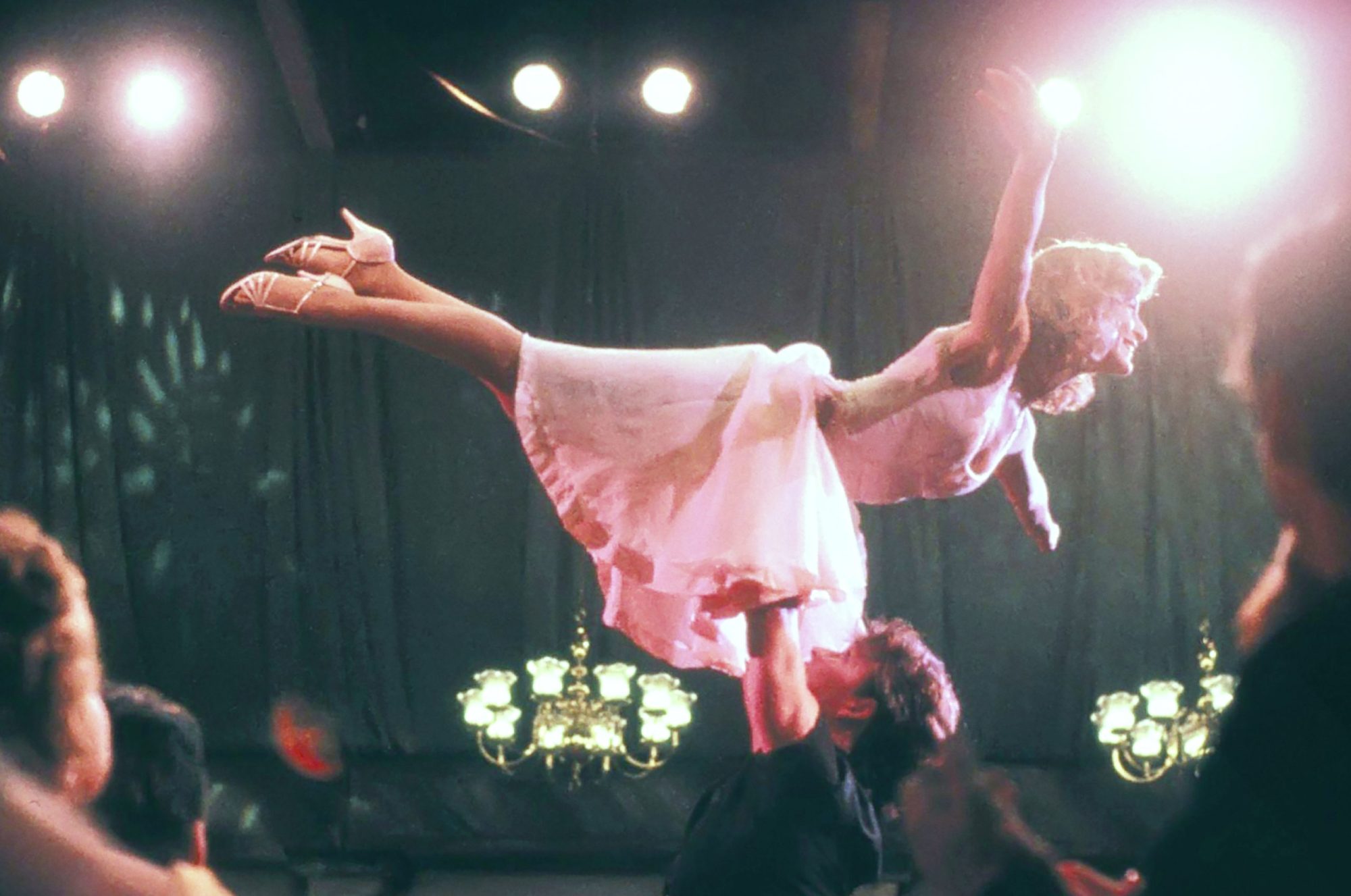
- Golden Globe Awards
“Dirty Dancing”: A Summer Rom-Com that Tackled Big Issues
Dirty Dancing had it all: star-crossed love, familial drama, sweaty, pretty people dancing, and a wildly popular soundtrack—all set against the backdrop of the serene Catskill Mountains of upstate New York. The film was based on screenwriter Eleanor Bergstein’s own childhood, and the premise was simple: in the summer of 1963, do-gooder Frances “Baby” Houseman (Jennifer Grey) is vacationing with her superficial family, including her judgmental father, played by Jerry Orbach, at an upscale, mostly-Jewish resort. Baby falls for older, earnest, working-class Johnny Castle (Patrick Swayze), and lots of drama (and leaping) ensues.
The 1987 film came out during the ‘Golden Age/Post-WWII’ Hollywood revival of the late 1980s and early 1990s that included other girlhood-journey gems like Shag and Mermaids (both were also set in 1963), Peggy Sue Got Married (mostly set in 1960), and Beaches (in which the protagonists meet on an Atlantic City beach in 1958). I remember those films influencing the fashion of my pre-teen years – summers of Keds (whose resurgence was directly linked to Dirty Dancing and Baby wearing them in the film), pedal pushers, tulle skirts, and full headbands.
Growing up in New York City, I knew the Catskills as a popular and convenient summer destination for city-dwellers, and growing up in a predominantly Jewish neighborhood, the movie felt like a peephole into my friends and neighbors’ vacations. And yet, as a young Black girl, I only saw people who looked like me on the screen when Johnny (whose job at the resort was to teach upper-class families “classical” dances) let loose with the other lower-class resort workers partaking in “dirty” dancing, or more specifically coded at that time: “race music.” I recognized the irresistible hooks from Black artists like the Ronnettes and the Shirelles, the girl bands that raised many of my favorite aunts.
The lively soundtrack, which was a mix of oldies and brilliantly melodramatic 80’s music (including a surprisingly pleasant track by Swayze), generated two multi-platinum albums and multiple singles. “(I’ve Had) The Time of My Life”, performed by Bill Medley and Jennifer Warnes, won the Academy Award and a Golden Globe Award for Best Original Song, and the Grammy Award for Best Pop Performance by a Duo or Group with Vocals.
I also remember Dirty Dancing as the first time I’d seen an abortion narrative play out on screen. (Johnny’s co-worker and dance partner Penny, played by Cynthia Rhodes, becomes gravely ill after an unsafe, illegal abortion.) It was the first time my young brain had to process what it meant for a woman to be in peril because of an unwanted pregnancy. As a ten-year-old, I hadn’t so much as kissed a boy, but I was starting to understand the scary ramifications of “adulthood” and sex.
Roe v. Wade passed in 1973, four years before I was born, so I grew up with an understanding that although abortion was a contentious issue, the right to terminate a pregnancy was law. There were news reports of abortion clinic bombings, many Lifetime and HBO Family Playhouse movies about teen pregnancies, and heated debates on newly popular talk shows like The Oprah Winfrey Show and The Phil Donahue Show about sex and women’s bodies, but Dirty Dancing was one of the first times I saw the issue drawn out in a relatable way, and one of the first times I could see what life was like before Roe passed.
“We saw someone who was hemorrhaging,” Grey said in a recent interview with the Los Angeles Times, speaking about the film. “We saw what happens to people without means — the haves and the have-nots. I love that part of the storyline because it was really a feminist movie in a rom-com. It was a perfect use of history.”
Little did she know that this part of the film would become more relevant today than it was in 1987. “This is just so fundamentally wrong,” Grey said of the recent Supreme Court ruling to annul abortion rights, “and it is sounding a bell for all women to rise up and use their voice now because we have assumed, since 1973, that our choice was safe and that it was never going to be overturned.”
Despite some initial pushback, like Clearasil dropping out of a promotion deal with the film due to the abortion plot, Dirty Dancing was a huge commercial success. Its enduring popularity led to a 2004 prequel, Dirty Dancing: Havana Nights, and a stage version of the film. A made-for-TV remake was also released in 2017. And since Baby can’t be put in a corner, a new sequel starring Grey will begin shooting next spring with an expected February 2024 release.